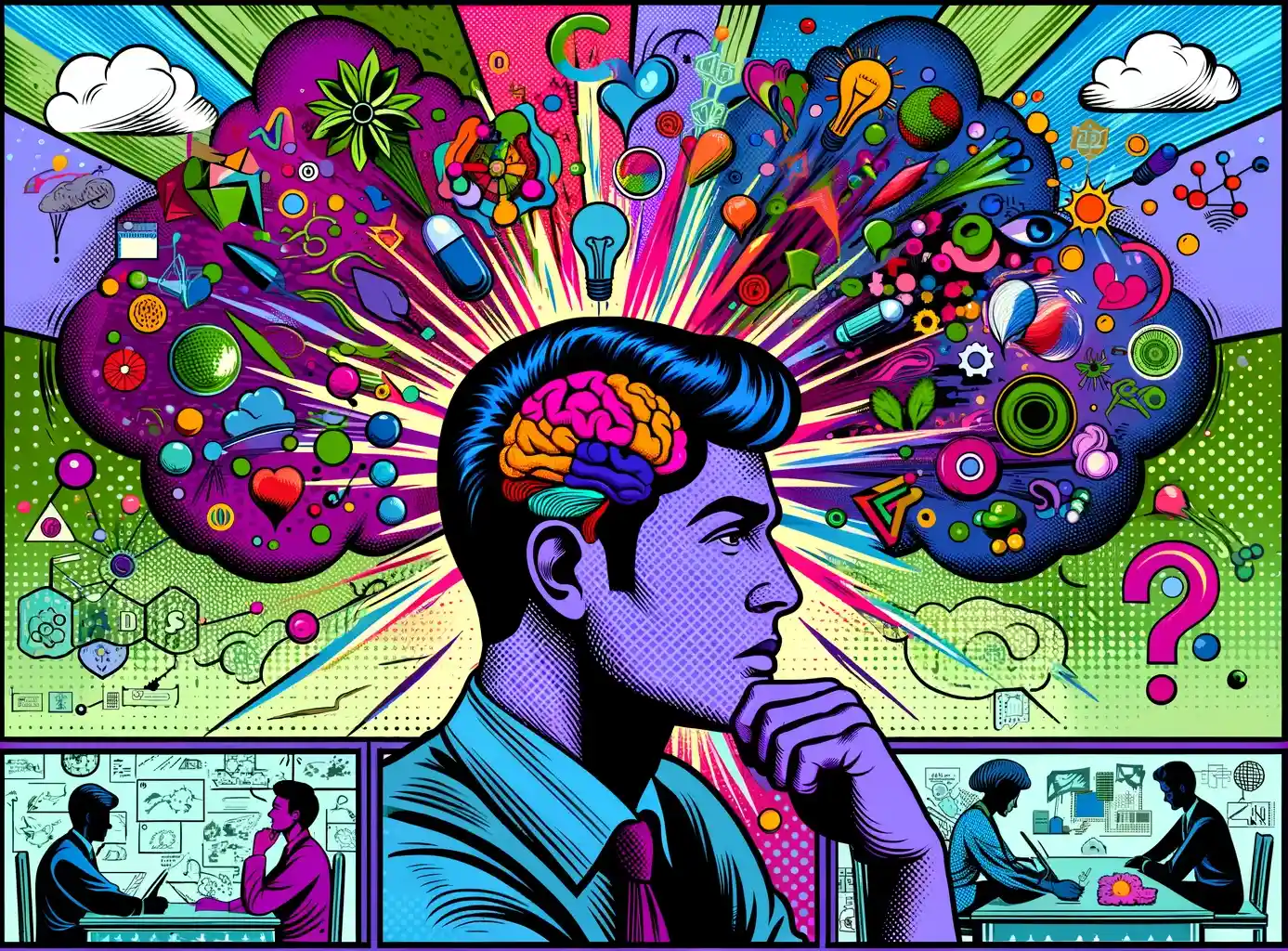Introduction
<h3><span style="font-weight: 400;">In an era where the ability to adapt and innovate is paramount, cognitive abilities stand as the bedrock of effective soft skills. Unlike other soft skills that primarily facilitate interactions with others, cognitive abilities are intrinsically linked to our inner mental processes—our thoughts, perceptions, and reasoning. These skills enable us to navigate the complexities of the world, make informed decisions, and solve intricate problems.</span></h3>
<h3><span style="font-weight: 400;">To truly appreciate the value of cognitive abilities, consider the story of Robinson Crusoe. Isolated on a deserted island, Crusoe’s survival depended not on his ability to communicate with others or lead a team, but on his cognitive prowess. His success was driven by his ability to reason, adapt to changing circumstances, learn from his environment, and devise innovative solutions to the challenges he faced. This underscores the universal importance of cognitive abilities, even in solitude.</span></h3>
<h3><span style="font-weight: 400;">Cognitive abilities encompass a range of skills, including flexibility, deductive reasoning, fluency of ideas, inductive reasoning, active learning, critical thinking, and learning strategies. These abilities form the foundation of our actions and thoughts, influencing every aspect of our lives. They are not just about intellectual capability but also involve emotional and perceptual processes, making them crucial for holistic development.</span></h3>
<h3><span style="font-weight: 400;">Imagine a world without cognitive abilities—where every problem is approached with a rigid mindset, devoid of creative solutions or adaptive strategies. Such a world would stagnate, unable to progress or innovate. Cognitive abilities are what drives humanity forward, fostering continuous improvement and the ability to thrive in ever-changing environments.</span></h3>
<h3><span style="font-weight: 400;">In the following sections, we will explore the importance of cognitive abilities, dissect their core components, and examine practical strategies for their development. Through real-life examples and case studies, we will illustrate how these skills can be cultivated and applied to achieve personal and professional excellence. Our journey begins with understanding why cognitive abilities are indispensable in today’s dynamic world.</span></h3>Importance of Cognitive Abilities
<h3><span style="font-weight: 400;">Cognitive abilities are not just about raw intelligence or academic prowess; they are the cornerstone of effective functioning in both personal and professional realms. These abilities underpin our capacity to process information, make informed decisions, solve problems, and adapt to new circumstances. Here’s why they are indispensable:</span></h3>
<h3><strong>Enhancing Decision-Making and Problem-Solving</strong></h3>
<h3><span style="font-weight: 400;">In today’s fast-paced and complex world, the ability to make sound decisions and solve problems efficiently is more critical than ever. Cognitive abilities such as <a class='no-underline text-accent'
href="https://www.wiseworld.ai/blog/critical-thinking" target="_blank">critical thinking</a> and <a class='no-underline text-accent'
href="https://www.wiseworld.ai/blog/deductive-reasoning" target="_blank">deductive reasoning</a> allow individuals to analyze situations from multiple angles, consider various outcomes, and choose the most effective course of action. For instance, a manager facing a crisis can leverage these skills to evaluate potential solutions, foresee obstacles, and implement strategies that mitigate risks and capitalize on opportunities.</span></h3>
<h3><strong>Driving Innovation and Creativity</strong></h3>
<h3><span style="font-weight: 400;">Innovation is the lifeblood of progress. Cognitive abilities like <a class='no-underline text-accent'
href="https://www.wiseworld.ai/blog/fluency-of-ideas" target="_blank">fluency of ideas</a> and <a class='no-underline text-accent'
href="https://www.wiseworld.ai/blog/inductive-reasoning" target="_blank">inductive reasoning</a> are essential for creativity. They enable individuals to think outside the box, generate novel solutions, and bring fresh perspectives to the table. Consider the case of Thomas Edison, whose ability to conceive a plethora of ideas led to the invention of the electric light bulb and many other groundbreaking technologies. Without such cognitive flexibility and creative thinking, innovation would be severely hampered.</span></h3>
<h3><strong>Adapting to Change</strong></h3>
<h3><span style="font-weight: 400;">Flexibility and <a class='no-underline text-accent'
href="https://www.wiseworld.ai/blog/flexibility" target="_blank">adaptability</a> are paramount in a world where change is the only constant. Whether it’s adapting to new technologies, shifting market trends, or unforeseen global events, cognitive abilities empower individuals to navigate change with resilience and agility. During the COVID-19 pandemic, countless businesses had to pivot their operations, adopt new business models, and embrace digital transformation. Those with strong cognitive abilities could adapt swiftly, ensuring their survival and even thriving amidst adversity.</span></h3>
<h3><strong>Fostering Continuous Learning</strong></h3>
<h3><span style="font-weight: 400;"><a class='no-underline text-accent'
href="https://www.wiseworld.ai/blog/active-learning" target="_blank">Active learning</a> and effective learning strategies are crucial for lifelong growth and development. Cognitive abilities facilitate the ability to absorb new information, integrate it with existing knowledge, and apply it in practical contexts. This continuous learning process is vital in a world where knowledge and skills quickly become outdated. Professionals who engage in active learning stay ahead of the curve, continually enhancing their competencies and staying relevant in their fields.</span></h3>
<h3><strong>Enhancing Emotional and Social Intelligence</strong></h3>
<h3><span style="font-weight: 400;">Cognitive abilities are closely linked with emotional and social intelligence. Critical thinking, for instance, helps individuals manage their emotions, understand others’ perspectives, and build stronger interpersonal relationships. By analyzing situations thoughtfully and empathetically, individuals can navigate social interactions more effectively, leading to better teamwork, leadership, and conflict resolution.</span></h3>
<h3><strong>Supporting Mental Health and Well-being</strong></h3>
<h3><span style="font-weight: 400;">Cognitive abilities also play a significant role in mental health and well-being. Skills like critical thinking and active learning can help individuals develop resilience, cope with stress, and maintain a positive outlook. For example, <a class='no-underline text-accent'
href="https://www.apa.org/ptsd-guideline/patients-and-families/cognitive-behavioral#:~:text=Cognitive%20behavioral%20therapy%20(CBT)%20is,disorders%2C%20and%20severe%20mental%20illness." target="_blank">cognitive-behavioral therapy</a> (CBT) uses cognitive restructuring techniques to help individuals identify and change negative thought patterns, demonstrating the practical application of cognitive skills in enhancing mental health.</span></h3>
<h3><strong>Bridging the Gap Between Knowledge and Application</strong></h3>
<h3><span style="font-weight: 400;">Knowing is one thing; being able to apply it effectively is another. Cognitive abilities bridge this gap by enabling individuals to transform abstract knowledge into practical solutions. This application is evident in various fields, from engineers designing innovative products to doctors diagnosing and treating complex medical conditions. By honing their cognitive abilities, professionals can better translate their expertise into tangible results.</span></h3>
<h3><strong>Building a Foundation for Other Soft Skills</strong></h3>
<h3><span style="font-weight: 400;">Finally, cognitive abilities form the bedrock of other soft skills. Whether it’s communication, leadership, teamwork, or work ethic, these abilities enhance an individual’s overall effectiveness. A leader, for instance, relies on cognitive skills to strategize, motivate, and guide their team. Similarly, effective communication often stems from the ability to think critically and articulate ideas clearly.</span></h3>
<h3><span style="font-weight: 400;">In summary, cognitive abilities are vital for navigating the complexities of modern life. They enable us to think critically, adapt to change, innovate, learn continuously, and maintain our mental and emotional well-being. As we proceed, we will explore the core components of cognitive abilities, providing deeper insights into each skill and its practical applications.</span></h3>Core Cognitive Abilities Skills
<h3><span style="font-weight: 400;">To fully grasp the breadth and impact of cognitive abilities, it's essential to delve into their core components. Each of these skills plays a unique role in shaping how we process information, approach problems, and interact with the world around us. By exploring these core cognitive abilities in detail, we can better understand their significance and learn how to cultivate them effectively. Let's begin with flexibility, a crucial skill for navigating the ever-changing landscape of modern life.</span></h3>
<h3><strong>Flexibility</strong></h3>
<h3><strong>"It is not the strongest of the species that survive, nor the most intelligent, but the one most responsive to change." – Charles Darwin</strong></h3>
<h3><span style="font-weight: 400;">Flexibility, often referred to as cognitive flexibility, is the ability to adapt one's thinking and behavior in response to changing circumstances and new information. This skill involves being open-minded, embracing new perspectives, and shifting strategies when necessary. In a rapidly evolving world, flexibility is crucial for both personal and professional success.</span></h3>
<h3><strong>Practical Application:</strong><span style="font-weight: 400;"> During the COVID-19 pandemic, businesses had to rapidly adapt to survive. Restaurants, for instance, pivoted from traditional dining services to offering takeout and delivery. Flexibility enabled these businesses to quickly reconfigure their operations and continue serving customers despite restrictions. Similarly, employees who adapted to remote work, learned new digital tools, and maintained productivity showcased their cognitive flexibility.</span></h3>
<h3><strong>Deductive Reasoning</strong></h3>
<h3><strong>"The supreme function of reason is to show man that some things are beyond reason." – Blaise Pascal</strong></h3>
<h3><span style="font-weight: 400;">Deductive reasoning is the ability to draw specific conclusions from general principles or premises. It involves logical thinking and the systematic application of known facts to solve problems or make decisions. This skill is essential for roles that require analytical thinking, problem-solving, and decision-making.</span></h3>
<h3><strong>Practical Application:</strong><span style="font-weight: 400;"> Detectives and investigators often rely on deductive reasoning to solve crimes. By applying general principles of forensic science and criminal behavior to specific cases, they can identify suspects and piece together evidence. In the business world, managers use deductive reasoning to analyze market trends and make strategic decisions based on data and historical patterns.</span></h3>
<h3><strong>Fluency of Ideas</strong></h3>
<h3><strong>"The best way to have a good idea is to have a lot of ideas." – Linus Pauling</strong></h3>
<h3><span style="font-weight: 400;">Fluency of ideas, or ideational fluency, is the ability to generate a large number of ideas or solutions to a problem. This skill is a key component of creativity and innovation, enabling individuals to think outside the box and explore multiple possibilities.</span></h3>
<h3><strong>Practical Application:</strong><span style="font-weight: 400;"> Inventors like Thomas Edison exemplify fluency of ideas. Edison held over 1,000 patents and invented numerous devices, including the phonograph and the electric light bulb. His ability to generate many ideas, test them, and refine them led to groundbreaking innovations. In modern settings, brainstorming sessions and design thinking workshops leverage ideational fluency to foster creativity and develop innovative solutions.</span></h3>
<h3><strong>Inductive Reasoning</strong></h3>
<h3><strong>"All our knowledge has its origins in our perceptions." – Leonardo da Vinci</strong></h3>
<h3><span style="font-weight: 400;">Inductive reasoning involves making generalizations based on specific observations or experiences. It is essential for forming hypotheses, developing theories, and making predictions. This skill is particularly valuable in scientific research, data analysis, and everyday problem-solving.</span></h3>
<h3><strong>Practical Application:</strong><span style="font-weight: 400;"> Scientists use inductive reasoning to formulate theories based on experimental data. For example, Charles Darwin developed the theory of evolution by observing variations in species and inferring broader biological principles. In business, marketers use inductive reasoning to identify consumer trends by analyzing purchasing behaviors and feedback, enabling them to tailor their strategies accordingly.</span></h3>
<h3><strong>Active Learning</strong></h3>
<h3><strong>"Tell me and I forget, teach me and I may remember, involve me and I learn." – Benjamin Franklin</strong></h3>
<h3><span style="font-weight: 400;">Active learning is the process of engaging with new information, reflecting on it, and applying it to different contexts. This skill involves a proactive approach to learning, characterized by curiosity, critical thinking, and continuous improvement.</span></h3>
<h3><strong>Practical Application:</strong><span style="font-weight: 400;"> Active learning is exemplified by professionals like Elon Musk, CEO of SpaceX and Tesla. Musk taught himself rocket science by reading textbooks and consulting experts, despite having no formal education in the field. His active learning approach enabled him to lead SpaceX to achieve significant milestones in space exploration. In educational settings, active learning techniques like group discussions, hands-on projects, and interactive simulations enhance student engagement and retention.</span></h3>
<h3><strong>Critical Thinking</strong></h3>
<h3><strong>"The important thing is not to stop questioning. Curiosity has its own reason for existing." – Albert Einstein</strong></h3>
<h3><span style="font-weight: 400;">Critical thinking is the ability to analyze, evaluate, and synthesize information to form reasoned judgments and make informed decisions. It involves questioning assumptions, recognizing biases, and considering multiple perspectives. This skill is crucial for effective problem-solving and decision-making in complex situations.</span></h3>
<h3><strong>Practical Application:</strong><span style="font-weight: 400;"> Ignaz Semmelweis, a Hungarian physician, used critical thinking to identify the importance of handwashing in preventing puerperal fever among women in childbirth. Despite facing resistance from the medical community, his critical analysis of data and outcomes eventually led to widespread acceptance of hand hygiene practices, saving countless lives. In corporate environments, critical thinking enables leaders to assess risks, identify opportunities, and develop strategic plans.</span></h3>
<h3><strong>Learning Strategies</strong></h3>
<h3><strong>"Learning never exhausts the mind." – Leonardo da Vinci</strong></h3>
<h3><span style="font-weight: 400;">Learning strategies involve selecting and using effective methods for acquiring, organizing, and retaining new information. These strategies enhance understanding and facilitate the application of knowledge in various contexts. Effective learning strategies are essential for personal growth and professional development.</span></h3>
<h3><strong>Practical Application:</strong><span style="font-weight: 400;"> Marie Curie, the pioneering scientist, utilized effective learning strategies throughout her career. Her meticulous experimentation, documentation, and continuous adaptation of methods led to groundbreaking discoveries in radioactivity and earned her two Nobel Prizes. In educational and professional settings, learning strategies such as spaced repetition, active recall, and collaborative learning help individuals master new skills and knowledge more efficiently.</span></h3>
<h3><span style="font-weight: 400;">By understanding and developing these core cognitive abilities, individuals can enhance their capacity to think critically, solve problems, innovate, and adapt to new challenges. These skills are fundamental to achieving personal and professional excellence, driving continuous improvement, and thriving in an increasingly complex world.</span></h3>Cognitive Abilities: Skills That Take You Far
<h3><span style="font-weight: 400;">Cognitive abilities are the driving force behind success in various facets of life. They empower individuals to navigate complexities, overcome challenges, and achieve their goals. Here’s how these skills can propel you forward in both personal and professional realms:</span></h3>
<h3><strong>Enhancing Professional Excellence</strong></h3>
<h3><span style="font-weight: 400;">In the professional world, cognitive abilities are indispensable for achieving excellence. Whether you are a leader, a manager, or a team member, these skills enable you to perform at your best.</span></h3>
<ul>
<li style="font-weight: 400;" aria-level="1">
<h3><strong>Strategic Thinking and Planning:</strong><span style="font-weight: 400;"> Cognitive skills such as critical thinking and deductive reasoning help professionals to strategize effectively. For instance, a business leader can use these skills to forecast market trends, plan long-term objectives, and devise actionable plans that align with organizational goals.</span></h3>
</li>
<li style="font-weight: 400;" aria-level="1">
<h3><strong>Problem-Solving and Innovation:</strong><span style="font-weight: 400;"> Fluency of ideas and inductive reasoning are crucial for problem-solving and innovation. By generating a multitude of ideas and drawing insightful conclusions from specific observations, professionals can develop innovative solutions to complex problems. This is particularly valuable in fields like technology, research, and entrepreneurship, where creativity and innovation are key drivers of success.</span></h3>
</li>
<li style="font-weight: 400;" aria-level="1">
<h3><strong>Decision-Making Under Pressure:</strong><span style="font-weight: 400;"> The ability to make sound decisions under pressure is a hallmark of effective leadership. Cognitive flexibility allows individuals to adapt their thinking in dynamic situations, consider various perspectives, and make informed decisions quickly. This skill is especially important in high-stakes environments such as emergency response, military operations, and executive leadership.</span></h3>
</li>
</ul>
<h3><strong>Personal Growth and Lifelong Learning</strong></h3>
<h3><span style="font-weight: 400;">Cognitive abilities are equally important for personal growth and lifelong learning. They foster continuous self-improvement and enable individuals to adapt to changing circumstances.</span></h3>
<ul>
<li style="font-weight: 400;" aria-level="1">
<h3><strong>Adaptability and Resilience:</strong><span style="font-weight: 400;"> Flexibility and active learning are essential for personal adaptability and resilience. These skills help individuals to embrace change, learn from new experiences, and bounce back from setbacks. For example, someone who loses their job can use cognitive flexibility to explore new career paths and active learning to acquire the necessary skills for a new profession.</span></h3>
</li>
<li style="font-weight: 400;" aria-level="1">
<h3><strong>Effective Communication and Relationships:</strong><span style="font-weight: 400;"> Cognitive abilities also enhance interpersonal skills. Critical thinking enables individuals to understand different viewpoints and communicate effectively. This leads to stronger relationships, better teamwork, and more effective conflict resolution. In personal relationships, the ability to think critically and empathize with others' perspectives fosters deeper connections and mutual understanding.</span></h3>
</li>
<li style="font-weight: 400;" aria-level="1">
<h3><strong>Emotional Intelligence and Well-being:</strong><span style="font-weight: 400;"> There is a strong link between cognitive abilities and emotional intelligence. By applying critical thinking to manage emotions and understand others, individuals can improve their emotional well-being and build healthier relationships. Techniques such as mindfulness and cognitive-behavioral strategies can enhance emotional regulation and resilience, contributing to overall mental health.</span></h3>
</li>
</ul>
<h3><strong>Driving Organizational Success</strong></h3>
<h3><span style="font-weight: 400;">Organizations that cultivate cognitive abilities within their workforce are better positioned for success. These skills contribute to a culture of innovation, continuous improvement, and strategic excellence.</span></h3>
<ul>
<li style="font-weight: 400;" aria-level="1">
<h3><strong>Fostering a Culture of Innovation:</strong><span style="font-weight: 400;"> Encouraging fluency of ideas and active learning among employees creates an environment where innovation thrives. Organizations like Google and Apple, known for their innovative cultures, actively promote brainstorming, experimentation, and continuous learning. This approach leads to breakthrough products and services that set industry standards.</span></h3>
</li>
<li style="font-weight: 400;" aria-level="1">
<h3><strong>Enhancing Team Performance:</strong><span style="font-weight: 400;"> Teams that leverage cognitive abilities such as critical thinking and flexibility perform better. These skills enable team members to analyze problems collaboratively, adapt to changing project requirements, and develop effective solutions. For example, agile development teams in software engineering use these skills to iterate quickly, respond to user feedback, and deliver high-quality products.</span></h3>
</li>
<li style="font-weight: 400;" aria-level="1">
<h3><strong>Strategic Leadership and Vision:</strong><span style="font-weight: 400;"> Leaders with strong cognitive abilities can articulate a clear vision, develop strategic plans, and guide their organizations through uncertainty. For instance, Satya Nadella’s leadership at Microsoft has been marked by a focus on continuous learning and adaptability, driving the company’s transformation and success in the competitive tech industry.</span></h3>
</li>
</ul>
<h3><strong>Educational Impact</strong></h3>
<h3><span style="font-weight: 400;">Cognitive abilities play a crucial role in education, influencing both teaching and learning processes.</span></h3>
<ul>
<li style="font-weight: 400;" aria-level="1">
<h3><strong>Student Engagement and Success:</strong><span style="font-weight: 400;"> Active learning strategies and critical thinking skills enhance student engagement and academic success. Educators who employ these methods create dynamic learning environments that foster curiosity and deeper understanding. For example, project-based learning and Socratic questioning encourage students to think critically and apply their knowledge practically.</span></h3>
</li>
<li style="font-weight: 400;" aria-level="1">
<h3><strong>Educator Effectiveness:</strong><span style="font-weight: 400;"> Teachers who develop their own cognitive abilities can better adapt their teaching methods to meet diverse student needs. By using deductive and inductive reasoning, educators can design more effective curricula, assess student progress accurately, and address learning gaps. This leads to improved educational outcomes and student satisfaction.</span></h3>
</li>
</ul>
<h3><span style="font-weight: 400;">Cognitive abilities are vital skills that can significantly enhance both personal and professional success. By developing and leveraging these abilities, individuals can achieve excellence, drive innovation, and contribute meaningfully to their organizations and communities. As we move forward, we will explore practical strategies for developing these essential cognitive skills.</span></h3> Developing Cognitive Abilities Skills
<h3><span style="font-weight: 400;">Enhancing cognitive abilities is a continuous journey that requires intentional practice and commitment. Here are effective strategies and methods to develop each of the core cognitive abilities:</span></h3>
<h3><strong>Developing Flexibility</strong></h3>
<h3><strong>Embrace Change and Uncertainty</strong></h3>
<ul>
<li style="font-weight: 400;" aria-level="1">
<h3><strong>Mindset Shift:</strong><span style="font-weight: 400;"> Cultivate a growth <a class='no-underline text-accent'
href="https://en.wikipedia.org/wiki/Mindset" target="_blank">mindset</a> by viewing challenges and changes as opportunities for growth. Embrace the idea that abilities can be developed through dedication and hard work.</span></h3>
</li>
<li style="font-weight: 400;" aria-level="1">
<h3><strong>Exposure to New Experiences:</strong><span style="font-weight: 400;"> Regularly engage in activities that push you out of your comfort zone. Travel, learn new skills, or take on different roles at work to broaden your perspectives.</span></h3>
</li>
</ul>
<h3><strong>Practice Mindfulness</strong></h3>
<ul>
<li style="font-weight: 400;" aria-level="1">
<h3><strong>Mindfulness Meditation:</strong><span style="font-weight: 400;"> Practice mindfulness meditation to enhance your ability to stay present and adapt to changing circumstances. This can improve cognitive flexibility by reducing stress and increasing mental clarity.</span></h3>
</li>
</ul>
<h3><strong>Enhancing Deductive Reasoning</strong></h3>
<h3><strong>Engage in Logical Puzzles and Games</strong></h3>
<ul>
<li style="font-weight: 400;" aria-level="1">
<h3><strong>Puzzles:</strong><span style="font-weight: 400;"> Solve puzzles like Sudoku, crosswords, and logic puzzles that require you to apply deductive reasoning skills.</span></h3>
</li>
<li style="font-weight: 400;" aria-level="1">
<h3><strong>Strategy Games:</strong><span style="font-weight: 400;"> Play strategy games such as chess or bridge, which involve planning, foresight, and logical deduction.</span></h3>
</li>
</ul>
<h3><strong>Structured Problem-Solving</strong></h3>
<ul>
<li style="font-weight: 400;" aria-level="1">
<h3><strong>Frameworks and Models:</strong><span style="font-weight: 400;"> Use problem-solving frameworks like SWOT analysis (Strengths, Weaknesses, Opportunities, Threats) and the scientific method to approach problems systematically and draw logical conclusions.</span></h3>
</li>
</ul>
<h3><strong>Boosting Fluency of Ideas</strong></h3>
<h3><strong>Brainstorming Techniques</strong></h3>
<ul>
<li style="font-weight: 400;" aria-level="1">
<h3><strong>Mind Mapping:</strong><span style="font-weight: 400;"> Use mind mapping to visually organize and generate ideas. This technique helps in exploring a central concept and branching out into various related ideas.</span></h3>
</li>
<li style="font-weight: 400;" aria-level="1">
<h3><strong>Divergent Thinking Exercises:</strong><span style="font-weight: 400;"> Engage in exercises that encourage divergent thinking, such as listing as many uses as possible for a common object (e.g., a paperclip).</span></h3>
</li>
</ul>
<h3><strong>Creative Practices</strong></h3>
<ul>
<li style="font-weight: 400;" aria-level="1">
<h3><strong>Journaling:</strong><span style="font-weight: 400;"> Keep a daily journal to jot down ideas, thoughts, and reflections. This practice can help in cultivating a habit of idea generation.</span></h3>
</li>
<li style="font-weight: 400;" aria-level="1">
<h3><strong>Collaborative Creativity:</strong><span style="font-weight: 400;"> Participate in collaborative projects and brainstorming sessions to benefit from the diverse perspectives and ideas of others.</span></h3>
</li>
</ul>
<h3><strong>Strengthening Inductive Reasoning</strong></h3>
<h3><strong>Pattern Recognition Activities</strong></h3>
<ul>
<li style="font-weight: 400;" aria-level="1">
<h3><strong>Observation:</strong><span style="font-weight: 400;"> Practice observing patterns in daily life and making generalizations. This could be through nature walks, studying market trends, or analyzing behavioral patterns.</span></h3>
</li>
<li style="font-weight: 400;" aria-level="1">
<h3><strong>Data Analysis:</strong><span style="font-weight: 400;"> Engage in activities that involve analyzing data sets and identifying trends, such as studying statistical reports or conducting research projects.</span></h3>
</li>
</ul>
<h3><strong>Scientific Inquiry</strong></h3>
<ul>
<li style="font-weight: 400;" aria-level="1">
<h3><strong>Experimentation:</strong><span style="font-weight: 400;"> Conduct small-scale experiments in areas of interest and draw conclusions based on observations. This could be as simple as experimenting with recipes in the kitchen or conducting scientific experiments at home.</span></h3>
</li>
</ul>
<h3><strong>Cultivating Active Learning</strong></h3>
<h3><strong>Lifelong Learning Commitment</strong></h3>
<ul>
<li style="font-weight: 400;" aria-level="1">
<h3><strong>Continuous Education:</strong><span style="font-weight: 400;"> Enroll in courses, attend workshops, and pursue certifications in areas of interest to keep your knowledge up to date.</span></h3>
</li>
<li style="font-weight: 400;" aria-level="1">
<h3><strong>Reading and Research:</strong><span style="font-weight: 400;"> Develop a habit of reading books, articles, and research papers regularly. Choose diverse topics to broaden your knowledge base.</span></h3>
</li>
</ul>
<h3><strong>Reflective Practices</strong></h3>
<ul>
<li style="font-weight: 400;" aria-level="1">
<h3><strong>Self-Reflection:</strong><span style="font-weight: 400;"> After learning new information, take time to reflect on what you’ve learned and how you can apply it. Keep a learning journal to track your progress and insights.</span></h3>
</li>
<li style="font-weight: 400;" aria-level="1">
<h3><strong>Feedback and Improvement:</strong><span style="font-weight: 400;"> Seek feedback from peers and mentors to identify areas for improvement and apply this feedback to enhance your skills.</span></h3>
</li>
</ul>
<h3><strong>Enhancing Critical Thinking</strong></h3>
<h3><strong>Questioning Assumptions</strong></h3>
<ul>
<li style="font-weight: 400;" aria-level="1">
<h3><strong>Socratic Method:</strong><span style="font-weight: 400;"> Practice the Socratic method by asking probing questions to challenge assumptions and explore underlying beliefs. This helps in developing deeper insights and understanding.</span></h3>
</li>
<li style="font-weight: 400;" aria-level="1">
<h3><strong>Debate and Discussion:</strong><span style="font-weight: 400;"> Engage in debates and discussions on various topics. Presenting and defending your viewpoints while considering opposing arguments strengthens critical thinking.</span></h3>
</li>
</ul>
<h3><strong>Analytical Reading and Writing</strong></h3>
<ul>
<li style="font-weight: 400;" aria-level="1">
<h3><strong>Critical Reading:</strong><span style="font-weight: 400;"> Read critically by analyzing the arguments presented, evaluating the evidence, and identifying biases. Take notes and summarize key points to reinforce understanding.</span></h3>
</li>
<li style="font-weight: 400;" aria-level="1">
<h3><strong>Essay Writing:</strong><span style="font-weight: 400;"> Write essays or articles on complex topics. This practice helps in organizing thoughts, forming coherent arguments, and presenting ideas logically.</span></h3>
</li>
</ul>
<h3><strong>Mastering Learning Strategies</strong></h3>
<h3><strong>Effective Study Techniques</strong></h3>
<ul>
<li style="font-weight: 400;" aria-level="1">
<h3><strong>Spaced Repetition:</strong><span style="font-weight: 400;"> Use spaced repetition techniques to enhance memory retention. Tools like flashcards and spaced repetition software can be helpful.</span></h3>
</li>
<li style="font-weight: 400;" aria-level="1">
<h3><strong>Active Recall:</strong><span style="font-weight: 400;"> Practice active recall by testing yourself on the material you’ve learned, rather than passively reviewing notes.</span></h3>
</li>
</ul>
<h3><strong>Adaptive Learning Methods</strong></h3>
<ul>
<li style="font-weight: 400;" aria-level="1">
<h3><strong>Personalized Learning:</strong><span style="font-weight: 400;"> Tailor your learning strategies to your personal preferences and strengths. Use a combination of visual, auditory, and kinesthetic learning methods to maximize understanding.</span></h3>
</li>
<li style="font-weight: 400;" aria-level="1">
<h3><strong>Collaborative Learning:</strong><span style="font-weight: 400;"> Participate in study groups or learning communities. Teaching others and engaging in group discussions can reinforce your own learning.</span></h3>
</li>
</ul>
<h3><span style="font-weight: 400;">By incorporating these strategies into your daily routine, you can systematically enhance your cognitive abilities. This continuous development will not only improve your problem-solving and decision-making skills but also empower you to adapt to new challenges and thrive in an ever-changing world. As we proceed, we will discuss the barriers to effective cognitive abilities and how to overcome them.</span></h3>Overcoming Barriers to Effective Cognitive Abilities
<h3><span style="font-weight: 400;">Despite the immense benefits of developing cognitive abilities, individuals often face various barriers that impede their cognitive growth. Understanding these barriers and implementing strategies to overcome them is crucial for effective cognitive development. Here are some common obstacles and ways to address them:</span></h3>
<h3><strong>Cognitive Biases</strong></h3>
<h3><strong>Understanding Cognitive Biases</strong></h3>
<ul>
<li style="font-weight: 400;" aria-level="1">
<h3><strong>Definition:</strong><span style="font-weight: 400;"><a class='no-underline text-accent'
href="https://en.wikipedia.org/wiki/List_of_cognitive_biases" target="_blank"> Cognitive biases</a> are systematic patterns of deviation from norm or rationality in judgment. They often result in perceptual distortion, inaccurate judgment, illogical interpretation, or what is broadly called irrationality.</span></h3>
</li>
<li style="font-weight: 400;" aria-level="1">
<h3><strong>Common Biases:</strong><span style="font-weight: 400;"> Some common cognitive biases include confirmation bias, where individuals favor information that confirms their preexisting beliefs, and availability heuristic, where people rely on immediate examples that come to mind.</span></h3>
</li>
</ul>
<h3><strong>Strategies to Overcome Cognitive Biases</strong></h3>
<ul>
<li style="font-weight: 400;" aria-level="1">
<h3><strong>Awareness and Education:</strong><span style="font-weight: 400;"> Educate yourself about different cognitive biases. Understanding how they work is the first step in mitigating their impact.</span></h3>
</li>
<li style="font-weight: 400;" aria-level="1">
<h3><strong>Critical Thinking Exercises:</strong><span style="font-weight: 400;"> Regularly practice critical thinking exercises that challenge your assumptions and encourage you to consider alternative viewpoints.</span></h3>
</li>
<li style="font-weight: 400;" aria-level="1">
<h3><strong>Diverse Perspectives:</strong><span style="font-weight: 400;"> Seek out diverse perspectives and feedback. Engaging with people who have different viewpoints can help counteract your biases.</span></h3>
</li>
</ul>
<h3><strong>Stress and Fatigue</strong></h3>
<h3><strong>Impact of Stress and Fatigue</strong></h3>
<ul>
<li style="font-weight: 400;" aria-level="1">
<h3><strong>Cognitive Load:</strong><span style="font-weight: 400;"> High levels of stress and fatigue can significantly impair cognitive functions such as memory, attention, and problem-solving.</span></h3>
</li>
<li style="font-weight: 400;" aria-level="1">
<h3><strong>Emotional Regulation:</strong><span style="font-weight: 400;"> Stress and fatigue also affect emotional regulation, making it harder to think clearly and make rational decisions.</span></h3>
</li>
</ul>
<h3><strong>Strategies to Manage Stress and Fatigue</strong></h3>
<ul>
<li style="font-weight: 400;" aria-level="1">
<h3><strong>Mindfulness and Relaxation Techniques:</strong><span style="font-weight: 400;"> Practice mindfulness, meditation, and deep-breathing exercises to manage stress. These techniques can help calm the mind and improve cognitive functioning.</span></h3>
</li>
<li style="font-weight: 400;" aria-level="1">
<h3><strong>Adequate Sleep:</strong><span style="font-weight: 400;"> Ensure you get enough sleep. Quality sleep is essential for cognitive health, as it helps consolidate memories and supports overall brain function.</span></h3>
</li>
<li style="font-weight: 400;" aria-level="1">
<h3><strong>Regular Breaks:</strong><span style="font-weight: 400;"> Take regular breaks during work or study sessions to avoid mental fatigue. Short breaks can help rejuvenate the mind and maintain high levels of productivity.</span></h3>
</li>
</ul>
<h3><strong>Lack of Motivation</strong></h3>
<h3><strong>Understanding Motivation Barriers</strong></h3>
<ul>
<li style="font-weight: 400;" aria-level="1">
<h3><strong>Intrinsic vs. Extrinsic Motivation:</strong><span style="font-weight: 400;"> Lack of motivation can stem from a reliance on extrinsic rewards (e.g., money, recognition) rather than intrinsic rewards (e.g., personal growth, satisfaction).</span></h3>
</li>
</ul>
<h3><strong>Strategies to Enhance Motivation</strong></h3>
<ul>
<li style="font-weight: 400;" aria-level="1">
<h3><strong>Set Clear Goals:</strong><span style="font-weight: 400;"> Establish clear, achievable goals that align with your values and interests. Having a clear sense of purpose can enhance intrinsic motivation.</span></h3>
</li>
<li style="font-weight: 400;" aria-level="1">
<h3><strong>Celebrate Small Wins:</strong><span style="font-weight: 400;"> Recognize and celebrate small achievements along the way. This can boost morale and keep you motivated.</span></h3>
</li>
<li style="font-weight: 400;" aria-level="1">
<h3><strong>Passion Projects:</strong><span style="font-weight: 400;"> Engage in activities and projects that you are passionate about. Passion-driven work is inherently motivating and can sustain long-term engagement.</span></h3>
</li>
</ul>
<h3><strong>Information Overload</strong></h3>
<h3><strong>Understanding Information Overload</strong></h3>
<ul>
<li style="font-weight: 400;" aria-level="1">
<h3><strong>Digital Age Challenge:</strong><span style="font-weight: 400;"> In the digital age, we are constantly bombarded with information, leading to information overload. This can overwhelm the cognitive system and reduce the quality of decision-making.</span></h3>
</li>
</ul>
<h3><strong>Strategies to Manage Information Overload</strong></h3>
<ul>
<li style="font-weight: 400;" aria-level="1">
<h3><strong>Prioritization:</strong><span style="font-weight: 400;"> Prioritize information based on relevance and importance. Focus on high-quality, reliable sources of information.</span></h3>
</li>
<li style="font-weight: 400;" aria-level="1">
<h3><strong>Digital Detox:</strong><span style="font-weight: 400;"> Regularly disconnect from digital devices and social media to reduce cognitive load. Allocate specific times for checking emails and social media to avoid constant interruptions.</span></h3>
</li>
<li style="font-weight: 400;" aria-level="1">
<h3><strong>Organized Information:</strong><span style="font-weight: 400;"> Use tools like to-do lists, calendars, and information management systems to organize and streamline information flow.</span></h3>
</li>
</ul>
<h3><strong>Fixed Mindset</strong></h3>
<h3><strong>Impact of a Fixed Mindset</strong></h3>
<ul>
<li style="font-weight: 400;" aria-level="1">
<h3><strong>Growth vs. Fixed Mindset:</strong><span style="font-weight: 400;"> A fixed mindset, where individuals believe their abilities and intelligence are static, can hinder cognitive development. In contrast, a growth mindset encourages continuous learning and improvement.</span></h3>
</li>
</ul>
<h3><strong>Strategies to Foster a Growth Mindset</strong></h3>
<ul>
<li style="font-weight: 400;" aria-level="1">
<h3><strong>Embrace Challenges:</strong><span style="font-weight: 400;"> View challenges as opportunities to learn and grow. Embrace failures as part of the learning process.</span></h3>
</li>
<li style="font-weight: 400;" aria-level="1">
<h3><strong>Seek Feedback:</strong><span style="font-weight: 400;"> Actively seek feedback and use it constructively to improve. Understand that effort and persistence are key to developing cognitive abilities.</span></h3>
</li>
<li style="font-weight: 400;" aria-level="1">
<h3><strong>Reflect on Progress:</strong><span style="font-weight: 400;"> Regularly reflect on your progress and acknowledge areas of growth. This can reinforce the belief that abilities can be developed through effort and practice.</span></h3>
</li>
</ul>
<h3><strong>Environmental Factors</strong></h3>
<h3><strong>Impact of Environmental Factors</strong></h3>
<ul>
<li style="font-weight: 400;" aria-level="1">
<h3><strong>Distractions:</strong><span style="font-weight: 400;"> A noisy or chaotic environment can hinder concentration and cognitive performance.</span></h3>
</li>
<li style="font-weight: 400;" aria-level="1">
<h3><strong>Lack of Resources:</strong><span style="font-weight: 400;"> Limited access to educational resources, such as books, courses, and mentors, can impede cognitive development.</span></h3>
</li>
</ul>
<h3><strong>Strategies to Optimize the Environment</strong></h3>
<ul>
<li style="font-weight: 400;" aria-level="1">
<h3><strong>Create a Conducive Workspace:</strong><span style="font-weight: 400;"> Set up a quiet, organized workspace free from distractions. Ensure good lighting and comfortable seating to enhance focus.</span></h3>
</li>
<li style="font-weight: 400;" aria-level="1">
<h3><strong>Access Resources:</strong><span style="font-weight: 400;"> Utilize online resources and libraries to access educational materials. Join study groups, online forums, and professional networks to connect with others and share knowledge.</span></h3>
</li>
<li style="font-weight: 400;" aria-level="1">
<h3><strong>Time Management:</strong><span style="font-weight: 400;"> Practice effective time management to allocate dedicated periods for focused work and learning. Use techniques like the Pomodoro method to maintain productivity.</span></h3>
</li>
</ul>
<h3><strong>Personal and Professional Balance</strong></h3>
<h3><strong>Balancing Cognitive Development with Other Responsibilities</strong></h3>
<ul>
<li style="font-weight: 400;" aria-level="1">
<h3><strong>Time Constraints:</strong><span style="font-weight: 400;"> Balancing work, personal life, and cognitive development can be challenging.</span></h3>
</li>
</ul>
<h3><strong>Strategies for Balance</strong></h3>
<ul>
<li style="font-weight: 400;" aria-level="1">
<h3><strong>Integrated Learning:</strong><span style="font-weight: 400;"> Integrate learning into daily routines. Listen to audiobooks during commutes, or practice problem-solving during downtime.</span></h3>
</li>
<li style="font-weight: 400;" aria-level="1">
<h3><strong>Set Realistic Expectations:</strong><span style="font-weight: 400;"> Set realistic expectations and avoid overcommitting. Focus on steady, incremental progress rather than rapid, unsustainable growth.</span></h3>
</li>
<li style="font-weight: 400;" aria-level="1">
<h3><strong>Self-Care:</strong><span style="font-weight: 400;"> Prioritize self-care and well-being. Physical health, nutrition, and relaxation are crucial for maintaining cognitive function and overall balance.</span></h3>
</li>
</ul>
<h3><span style="font-weight: 400;">By recognizing and addressing these barriers, individuals can create an environment conducive to cognitive development. This proactive approach not only enhances cognitive abilities but also fosters a resilient, adaptable mindset capable of thriving in a dynamic world. Next, we will explore real-life examples of effective cognitive abilities in action.</span></h3>Real-life Examples of Effective Cognitive Abilities
<h2><span style="font-weight: 400;">To truly understand the transformative power of cognitive abilities, it’s helpful to look at how they have been applied in real-world scenarios. By examining case studies and success stories, we can see the tangible benefits and far-reaching impacts of these skills. These examples highlight how cognitive abilities drive innovation, adaptability, and problem-solving across various fields.</span></h2>
<h3><strong>Case Studies of Successful Implementation of Cognitive Abilities</strong></h3>
<h2><strong>Case Study 1: NASA’s Mars Rover Missions</strong></h2>
<h2><strong>Background:</strong><span style="font-weight: 400;"><a class='no-underline text-accent'
href="https://science.nasa.gov/mission/mars-exploration-rovers-spirit-and-opportunity/" target="_blank"> NASA’s Mars Rover</a> missions, including the highly successful Curiosity and Perseverance rovers, required extensive planning, innovation, and problem-solving to explore the Martian surface.</span></h2>
<h2><strong>Cognitive Abilities Used:</strong></h2>
<ul>
<li style="font-weight: 400;" aria-level="1">
<h2><strong>Deductive Reasoning:</strong><span style="font-weight: 400;"> Scientists and engineers used deductive reasoning to design and test the rovers, ensuring they could withstand harsh Martian conditions.</span></h2>
</li>
<li style="font-weight: 400;" aria-level="1">
<h2><strong>Critical Thinking:</strong><span style="font-weight: 400;"> The team employed critical thinking to troubleshoot issues in real-time, such as when Perseverance faced unexpected obstacles during its landing sequence.</span></h2>
</li>
</ul>
<h2><strong>Outcome:</strong><span style="font-weight: 400;"> The success of these missions has provided invaluable data about Mars, advancing our understanding of the planet and paving the way for future manned missions. The innovative solutions and problem-solving strategies developed during these missions have also contributed to advancements in robotics and space exploration technology.</span></h2>
<h2><strong>Case Study 2: Patagonia’s Sustainable Business Model</strong></h2>
<h2><strong>Background:</strong><span style="font-weight: 400;"><a class='no-underline text-accent'
href="https://www.patagonia.com/our-footprint/" target="_blank"> Patagonia</a>, the outdoor apparel company, is known for its commitment to sustainability and environmental responsibility, a strategy that requires innovative thinking and adaptability.</span></h2>
<h2><strong>Cognitive Abilities Used:</strong></h2>
<ul>
<li style="font-weight: 400;" aria-level="1">
<h2><strong>Flexibility:</strong><span style="font-weight: 400;"> Patagonia adapted its business practices to focus on sustainability, implementing new processes and materials that reduce environmental impact.</span></h2>
</li>
<li style="font-weight: 400;" aria-level="1">
<h2><strong>Active Learning:</strong><span style="font-weight: 400;"> The company continuously learns from environmental research and integrates these insights into its product design and corporate policies.</span></h2>
</li>
</ul>
<h2><strong>Outcome:</strong><span style="font-weight: 400;"><a class='no-underline text-accent'
href="https://www.businessmodelsinc.com/en/inspiration/blogs/the-business-model-of-patagonia" target="_blank"> Patagonia’s sustainable business model</a> has set industry standards and attracted a loyal customer base that values environmental responsibility. Their approach has also influenced other companies to adopt more sustainable practices, demonstrating the broader impact of cognitive abilities in driving corporate social responsibility.</span></h2>
<h3><strong>Success Stories of Teams or Individuals Thriving Through Cognitive Abilities</strong></h3>
<h2><strong>Success Story 1: Satya Nadella’s Leadership at Microsoft</strong></h2>
<h2><strong>Background:</strong><span style="font-weight: 400;"> When <a class='no-underline text-accent'
href="https://news.microsoft.com/exec/satya-nadella/" target="_blank">Satya Nadella</a> became CEO of Microsoft in 2014, the company was facing significant challenges, including declining relevance in the tech industry and a stagnant corporate culture.</span></h2>
<h2><strong>Cognitive Abilities Used:</strong></h2>
<ul>
<li style="font-weight: 400;" aria-level="1">
<h2><strong>Active Learning:</strong><span style="font-weight: 400;"> Nadella prioritized continuous learning and growth, encouraging employees to embrace a "learn-it-all" mindset rather than a "know-it-all" attitude.</span></h2>
</li>
<li style="font-weight: 400;" aria-level="1">
<h2><strong>Flexibility:</strong><span style="font-weight: 400;"> He led the shift towards cloud computing and subscription-based services, transforming Microsoft's business model and product offerings.</span></h2>
</li>
</ul>
<h2><strong>Outcome:</strong><span style="font-weight: 400;"> Under Nadella’s leadership, Microsoft has regained its status as a leading tech innovator, with significant growth in cloud services and artificial intelligence. The company’s market value has soared, and its culture has become more dynamic and inclusive.</span></h2>
<h2><strong>Success Story 2: Rosalind Franklin’s Contribution to DNA Research</strong></h2>
<h2><strong>Background:</strong><span style="font-weight: 400;"><a class='no-underline text-accent'
href="https://www.kcl.ac.uk/the-structure-of-dna-how-dr-rosalind-franklin-contributed-to-the-story-of-life-2#:~:text=The%20discovery%20of%20the%20structure,development%20of%20all%20living%20organisms." target="_blank"> Rosalind Franklin</a> was a pioneering scientist whose work with X-ray crystallography was crucial in understanding the molecular structures of DNA.</span></h2>
<h2><strong>Cognitive Abilities Used:</strong></h2>
<ul>
<li style="font-weight: 400;" aria-level="1">
<h2><strong>Inductive Reasoning:</strong><span style="font-weight: 400;"> Franklin’s ability to make generalizations based on her meticulous observations and photographic evidence was key to revealing the double-helix structure of DNA.</span></h2>
<h3><strong>Cognitive Abilities in Everyday Life</strong></h3>
<h2><strong>Example 1: Navigating Career Changes</strong></h2>
<h2><strong>Background:</strong><span style="font-weight: 400;"> Many professionals face significant career changes, whether due to industry shifts, personal interests, or economic factors.</span></h2>
<h2><strong>Cognitive Abilities Used:</strong></h2>
<ul>
<li style="font-weight: 400;" aria-level="1">
<h2><strong>Flexibility:</strong><span style="font-weight: 400;"> Adapting to new industries or roles requires cognitive flexibility, allowing individuals to learn new skills and embrace different professional environments.</span></h2>
</li>
<li style="font-weight: 400;" aria-level="1">
<h2><strong>Active Learning:</strong><span style="font-weight: 400;"> Continuously acquiring new knowledge and competencies is essential for staying relevant and competitive in the job market.</span></h2>
</li>
</ul>
<h2><strong>Outcome:</strong><span style="font-weight: 400;"> Individuals who effectively apply these cognitive abilities can successfully transition to new careers, often finding more fulfilling and better-suited roles. For example, a marketing professional might pivot to a digital marketing specialist role by learning new technologies and methodologies.</span></h2>
<h2><strong>Example 2: Personal Growth through Hobbies</strong></h2>
<h2><strong>Background:</strong><span style="font-weight: 400;"> Engaging in hobbies and personal interests can significantly enhance cognitive abilities and overall well-being.</span></h2>
<h2><strong>Cognitive Abilities Used:</strong></h2>
<ul>
<li style="font-weight: 400;" aria-level="1">
<h2><strong>Fluency of Ideas:</strong><span style="font-weight: 400;"> Creative hobbies like painting, writing, or music encourage the generation of new ideas and creative expression.</span></h2>
</li>
<li style="font-weight: 400;" aria-level="1">
<h2><strong>Critical Thinking:</strong><span style="font-weight: 400;"> Strategic games like chess or complex crafts like woodworking require critical thinking and problem-solving skills.</span></h2>
</li>
</ul>
<h2><strong>Outcome:</strong><span style="font-weight: 400;"> Hobbies that challenge the brain can lead to improved cognitive function, greater emotional well-being, and a more balanced life. For instance, someone who takes up learning a musical instrument may experience enhanced memory, better stress management, and increased creative thinking.</span></h2>
<h3><strong>Case Studies of Cognitive Abilities in Teams</strong></h3>
<h2><strong>Case Study 1: Google’s Innovative Work Environment</strong></h2>
<h2><strong>Background:</strong><span style="font-weight: 400;"> Google is renowned for its innovative work environment, which encourages creativity and collaboration among its employees.</span></h2>
<h2><strong>Cognitive Abilities Used:</strong></h2>
<ul>
<li style="font-weight: 400;" aria-level="1">
<h2><strong>Fluency of Ideas:</strong><span style="font-weight: 400;"><a class='no-underline text-accent'
href="https://en.wikipedia.org/wiki/Side_project_time" target="_blank"> Google’s 20%</a> Project allows employees to spend 20% of their time on projects they are passionate about, fostering creativity and new ideas.</span></h2>
</li>
<li style="font-weight: 400;" aria-level="1">
<h2><strong>Critical Thinking:</strong><span style="font-weight: 400;"> Teams at Google use critical thinking to tackle complex problems, such as improving search algorithms and developing new products like Google Maps.</span></h2>
</li>
</ul>
<h2><strong>Outcome:</strong><span style="font-weight: 400;"> This culture of innovation has led to numerous successful products and services, maintaining Google’s position as a leader in technology and digital services.</span></h2>
<h2><strong>Case Study 2: Agile Teams in Software Development</strong></h2>
<h2><strong>Background:</strong><span style="font-weight: 400;"> Agile methodologies have revolutionized software development by promoting flexibility, collaboration, and continuous improvement.</span></h2>
<h2><strong>Cognitive Abilities Used:</strong></h2>
<ul>
<li style="font-weight: 400;" aria-level="1">
<h2><strong>Flexibility:</strong><span style="font-weight: 400;"> Agile teams quickly adapt to changing project requirements and customer feedback, iterating on their work to deliver high-quality software.</span></h2>
</li>
<li style="font-weight: 400;" aria-level="1">
<h2><strong>Active Learning:</strong><span style="font-weight: 400;"> Continuous learning and improvement are integral to the Agile process, with teams regularly reflecting on their work and seeking ways to enhance their performance.</span></h2>
</li>
</ul>
<h2><strong>Outcome:</strong><span style="font-weight: 400;"> Agile teams consistently deliver better software faster, with higher customer satisfaction. Companies that adopt Agile methodologies often see improved productivity, faster time-to-market, and increased innovation.</span></h2>
<h2><span style="font-weight: 400;">These real-life examples demonstrate how cognitive abilities play a crucial role in achieving success across various domains. From corporate giants like NASA and Patagonia to individual pioneers like Satya Nadella and Rosalind Franklin, the effective application of cognitive skills leads to innovation, adaptability, and remarkable achievements. By understanding and developing these abilities, individuals and teams can navigate challenges, seize opportunities, and drive continuous improvement in their personal and professional lives. In the next section, we will summarize the key takeaways and provide additional resources for further development of cognitive abilities.</span></h2>
</li>
<li style="font-weight: 400;" aria-level="1">
<h2><strong>Critical Thinking:</strong><span style="font-weight: 400;"> She approached her research with a rigorous analytical mindset, questioning assumptions and meticulously verifying her findings.</span></h2>
</li>
</ul>
<h2><strong>Outcome:</strong><span style="font-weight: 400;"> Although her contributions were not fully recognized during her lifetime, Franklin’s work was instrumental in the discovery of the DNA double-helix. Her legacy continues to inspire scientists and underscores the importance of cognitive abilities in scientific discovery.</span></h2>
In a Nutshell
<h3><span style="font-weight: 400;">Cognitive abilities are the cornerstone of effective soft skills, enabling us to think critically, solve problems, and adapt to ever-changing environments. These skills are not just beneficial; they are essential for personal growth, professional success, and overall well-being. Let's recap the key points we've explored:</span></h3>
<ul>
<li style="font-weight: 400;" aria-level="1">
<h3><strong>Foundation of Other Soft Skills:</strong><span style="font-weight: 400;"> Cognitive abilities support and enhance other soft skills such as communication, leadership, and teamwork. They provide the mental framework needed to interact effectively with others and navigate complex situations.</span></h3>
</li>
<li style="font-weight: 400;" aria-level="1">
<h3><strong>Adaptability and Flexibility:</strong><span style="font-weight: 400;"> In a world where change is constant, cognitive flexibility allows individuals to adapt swiftly and efficiently. This skill is crucial for managing unexpected challenges and seizing new opportunities.</span></h3>
</li>
<li style="font-weight: 400;" aria-level="1">
<h3><strong>Critical Thinking and Decision-Making:</strong><span style="font-weight: 400;"> Critical thinking enables us to analyze information, evaluate options, and make informed decisions. This ability is vital for both personal and professional contexts, ensuring that we can navigate complexities with clarity and precision.</span></h3>
</li>
<li style="font-weight: 400;" aria-level="1">
<h3><strong>Innovation and Creativity:</strong><span style="font-weight: 400;"> Fluency of ideas and inductive reasoning are the driving forces behind innovation. These cognitive skills empower individuals to generate novel solutions and foster a culture of continuous improvement.</span></h3>
</li>
<li style="font-weight: 400;" aria-level="1">
<h3><strong>Continuous Learning:</strong><span style="font-weight: 400;"> Active learning and effective learning strategies are essential for staying relevant in a fast-paced world. By committing to lifelong learning, we can keep our skills sharp and adaptable.</span></h3>
</li>
<li style="font-weight: 400;" aria-level="1">
<h3><strong>Mental Health and Emotional Intelligence:</strong><span style="font-weight: 400;"> Cognitive abilities also play a significant role in mental health. They help us manage stress, develop resilience, and understand our emotions better, contributing to overall emotional well-being.</span></h3>
</li>
<li style="font-weight: 400;" aria-level="1">
<h3><strong>Real-world Applications:</strong><span style="font-weight: 400;"> From NASA’s Mars Rover missions to Patagonia’s sustainable business model, real-world examples illustrate how cognitive abilities lead to remarkable achievements. These case studies show that applying these skills can drive success across various fields.</span></h3>
</li>
<li style="font-weight: 400;" aria-level="1">
<h3><strong>Overcoming Barriers:</strong><span style="font-weight: 400;"> We discussed common barriers such as cognitive biases, stress, and information overload, and provided strategies to overcome them. Addressing these challenges is key to maximizing our cognitive potential.</span></h3>
</li>
</ul>
<h3><span style="font-weight: 400;">Thank you for joining us on this exploration of cognitive abilities. We hope this guide has provided valuable insights and practical strategies to help you enhance your cognitive skills. By investing in these abilities, you are equipping yourself with the tools to thrive in an increasingly complex world. Keep learning, stay curious, and continue to develop the cognitive skills that will take you far.</span></h3>
<h3><span style="font-weight: 400;">In the next section, we will provide additional resources for further development of your cognitive abilities. Stay tuned!</span></h3>Resources for Further Reading and Development
<h3><span style="font-weight: 400;">To further develop your cognitive abilities, consider the following resources. These books, movies, and online platforms offer valuable insights, practical exercises, and inspirational stories that can enhance your understanding and application of cognitive skills.</span></h3>
<h3><strong>Books:</strong></h3>
<ul>
<li style="font-weight: 400;" aria-level="1">
<h3><strong>"Thinking, Fast and Slow" by Daniel Kahneman:</strong> <a class='no-underline text-accent'
href="https://books.google.com/books?id=ZuKTvERuPG8C&printsec=frontcover&dq=Thinking,+Fast+and+Slow%22+by+Daniel+Kahneman&hl=en&newbks=1&newbks_redir=0&sa=X&ved=2ahUKEwjuvL-VtcmHAxWl8QIHHQIrDqYQ6AF6BAgLEAI"><span style="font-weight: 400;">This book</span></a><span style="font-weight: 400;"> explores the dual systems of thought—intuitive and deliberate—and how they shape our judgments and decisions. It's essential for understanding cognitive biases and improving critical thinking.</span></h3>
</li>
<li style="font-weight: 400;" aria-level="1">
<h3><strong>"The Power of Habit" by Charles Duhigg:</strong> <a class='no-underline text-accent'
href="https://books.google.com/books?id=1xKf7bBOW0QC&printsec=frontcover&dq=The+Power+of+Habit%22+by+Charles+Duhigg&hl=en&newbks=1&newbks_redir=0&sa=X&ved=2ahUKEwiwm4G2tcmHAxUi3QIHHRzqLQYQ6AF6BAgFEAI"><span style="font-weight: 400;">This book</span></a><span style="font-weight: 400;"> delves into the science of habits and how they impact our lives. It provides strategies for developing positive habits that enhance cognitive abilities such as active learning and flexibility.</span></h3>
</li>
<li style="font-weight: 400;" aria-level="1">
<h3><strong>"Mindset: The New Psychology of Success" by Carol S. Dweck:</strong> <a class='no-underline text-accent'
href="https://books.google.com/books?id=fdjqz0TPL2wC&printsec=frontcover&dq=Mindset:+The+New+Psychology+of+Success%22+by+Carol+S.+Dweck&hl=en&newbks=1&newbks_redir=0&sa=X&ved=2ahUKEwj84OrOtcmHAxW72gIHHbU0GwgQ6AF6BAgNEAI"><span style="font-weight: 400;">This book</span></a><span style="font-weight: 400;"> explains the concept of a growth mindset and how adopting this mindset can improve learning, resilience, and problem-solving skills.</span></h3>
</li>
</ul>
<h3><strong>Movies:</strong></h3>
<ul>
<li style="font-weight: 400;" aria-level="1">
<h3><strong>"A Beautiful Mind" (2001):</strong> <a class='no-underline text-accent'
href="https://www.imdb.com/title/tt0268978/"><span style="font-weight: 400;">The story of John Nash</span></a><span style="font-weight: 400;">, a brilliant mathematician, showcases the power of critical thinking and resilience. It illustrates the profound impact of cognitive abilities in overcoming personal and professional challenges.</span></h3>
</li>
<li style="font-weight: 400;" aria-level="1">
<h3><strong>"The Imitation Game" (2014):</strong><a class='no-underline text-accent'
href="https://www.imdb.com/title/tt2084970/"><span style="font-weight: 400;"> The story of Alan Turin</span></a><span style="font-weight: 400;">g, highlighting deductive reasoning and problem-solving during World War II. It demonstrates the importance of cognitive skills in achieving groundbreaking achievements.</span></h3>
</li>
</ul>
<h3><strong>Online Platform:</strong></h3>
<ul>
<li style="font-weight: 400;" aria-level="1">
<h3><strong>WiseWorld.ai:</strong><span style="font-weight: 400;"> This platform offers an open-world story simulation designed to enhance understanding of soft skills, including cognitive abilities. Through interactive scenarios and practical exercises, WiseWorld.ai helps individuals develop and refine their cognitive skills, fostering a proactive mindset.</span></h3>
</li>
</ul>
<h3><span style="font-weight: 400;">These resources serve as valuable guides for leaders, HR professionals, and individuals alike, seeking to deepen their understanding of cognitive abilities and their transformative impact on personal and professional success. By engaging with these materials, you can gain new perspectives, refine your skills, and continue your journey of lifelong learning.</span></h3>











